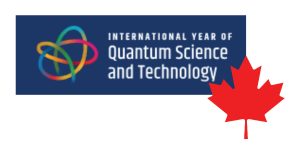Working together to celebrate 2025 as the International Year of Quantum Science and Technology (IYQ) 
The International Year of Quantum Science and Technology is a global initiative that aims to strengthen national capacities in the basic sciences and science education. This initiative will highlight the contribution of quantum science to our increased knowledge and understanding of the physical universe, as well as the critical role of quantum science and technology in developing sustainable solutions in energy, education, communications, and human health.
We encourage individuals, organizations, and corporations, particularly those within the quantum technology sector, to participate in this UN-declared year of Quantum Science and Technology and use our website to let everyone know what you are doing.
Want to learn more and participate?
- Celebrate Quantum Canada: Open Doors on May 3, 2025!
Join a nationwide day of free, accessible events showcasing Canada’s leadership in quantum science and technology—featuring tours, talks, workshops, and more. Register your event and submit an application, by April 17, to receive up to $300 in free promotional materials for your event; free QuEST outreach materials are also available! - Visit the International Year of Quantum Canada (IYQCAN) website
- Interested in becoming an official sponsor of the Canadian activities?
- Interested in proposing possible content for a special issue of Physics in Canada?
- Contact a IYQCAN team member
